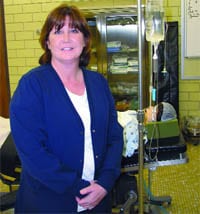Instruments to Job Security Surgical Technicians Are in Growing Demand
They’re called ‘surg techs.’
That’s a the colloquialism within health care circles for the surgical technician, an individual who plays an important, if often overlooked or misunderstood, role in the operating room. Actually, the prevailing term in the industry is certified surgical technician, because there is a push on (even a legislative initiative) to require certification for these front-line workers. But more on that later.
When some think of surgical technologists, thoughts turn to old movies and TV shows depicting operating rooms. “Someone would say ‘scalpel,’ and a person you usually didn’t even see would hand over a scalpel,” said Mary Jayne (M.J.) Rossman, chair of the Surgical Technology Department at Springfield Technical Community College. “That’s the surgical technologist — but there’s much, much more to this job.”
Indeed, the surg tech is responsible for a host of duties, Rossman explained, adding that these individuals handle everything from making sure that a sterile environment is maintained in the operating room to second-assisting surgeons during procedures to counting instruments when the work is done to make sure everything is accounted for.
“It’s important work — the surg tech is an integral part of the surgical team,” she said, adding that she’s been doing this kind of work for more than 30 years (the C.S.T. next to her name on her business card stands for ‘certified surgical technologist’) and has seen myriad changes in science and technology in the operating room — from robotics to joint-replacement surgery to minimally invasive procedures — all of which have impacted the surg tech’s responsibilities.
But the constant is attention to detail, and, for lack of better terminology, being able to read and anticipate the thoughts of the surgeons in the operating room, she said.
“It’s not just about technology and knowing instruments,” she explained. “This is a very people-oriented field; the surg techs are part of a team.”
The position isn’t new, said Antoinette Berryman, an instructor in the STCC program who also extensive experience in the field, but it has evolved over the years and gained greater appreciation within the health care community.
Thus, surg techs are in demand, said Rossman, noting that most all recent graduates from STCC’s two-year program have jobs waiting for them when they graduate — jobs with good wage scales, with many in the field earning $20 or more an hour, and some getting $5 an hour just to be on call. And while many of the jobs are in hospitals, there are also opportunities in surgical centers, medical labs, organ-procurement centers, and other facilities.
The STCC program graduates a handful of students each year, Rossman continued, adding that demand in the marketplace exceeds supply, and she expects that this phenomenon, coupled with attempts to increase of the field, will boost enrollment.
Berryman agreed, and said the situation is compounded by the fact that many individuals working as surg techs will be retiring over the next several years, and health care providers will be challenged to fill those vacancies — as well as those in several other professions.
“The average age for surg techs is somewhere in the mid-40s,” she explained. “Many people will be retiring soon, and some are already looking to work part-time. Facilities will need replacements, so this will be an attractive field to move into; it’s already attractive.”
As she talked about all that the surg tech handles in the OR, Berryman stopped for a minute and went to one the tables in the simulation lab where the program’s students gain hands-on experience. On it were literally dozens of different surgical instruments.
“That’s just a small sampling of what they have to know,” she said, adding that there are hundreds, if not thousands, of different instruments used in the operating room today. Surg techs have to know what each one is called, how it’s used, and even whether a specific implement is really the one the surgeon wants when he or she asks for it, she said, adding that there is much more on-the-job description.
For all these reasons, there is movement to require that surg techs be certified, said Kathy Sawtelle, another instructor in the STCC program and one of the leaders in that effort. Legislation has been filed in the Bay State, she explained, and debate continues on the matter.
Perhaps 40{06cf2b9696b159f874511d23dbc893eb1ac83014175ed30550cfff22781411e5} of the surg techs working across the country (and a slightly smaller number in Massachusetts) are not certified, she explained, adding that this is a point of concern for the health care industry — or should be — because of the importance of the work being handled by these individuals.
“In some hospitals, if they’re short on staff, they’ll have an orderly scrub up to assist,” she explained. “If this legislation passes, they can’t do that anymore, and that’s want we want, because the job is too important to be left to be people who aren’t certified.”



Comments are closed.